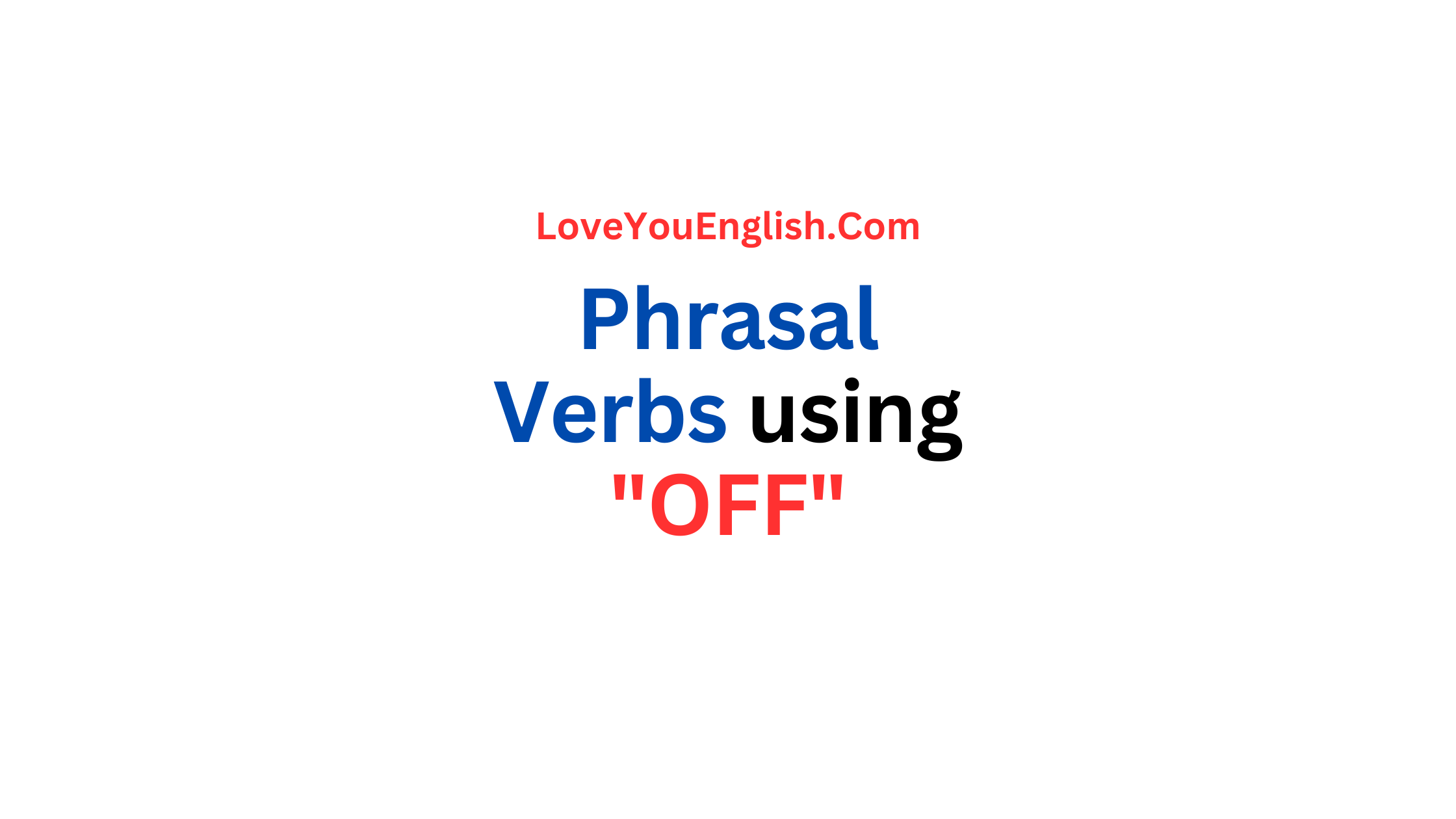30 Phrasal Verbs using “OFF” with Meanings and Sentences
Phrasal verbs are a key part of natural English, and one of the most commonly used particles in phrasal verbs is “off.”
Native speakers use off phrasal verbs daily in conversations, emails, movies, and workplace communication.
However, many English learners struggle to understand their meanings because the verb and particle together often create a new meaning.
In this lesson, you will learn 30 important phrasal verbs using “off”, along with easy meanings and simple example sentences.
These phrasal verbs will help you improve spoken English, expand vocabulary, and understand real-life English more confidently.
This list is especially useful for students, teachers, and IELTS aspirants.
This topic is part of our English Phrasal Verbs for English learners.
Break off – To separate apart from a whole.
She broke off a piece of chocolate and handed it to me.
Call off – To cancel something.
They called off the meeting due to unexpected weather conditions.
Take off – To remove something or to ascend (as in an aircraft).
He took off his coat when he came inside.
The plane will take off in about 30 minutes.
Show off – To display something proudly or boastfully.
He always tries to show off his new gadgets.
Get off – To leave a place, especially a vehicle, or to avoid punishment.
We need to get off the bus at the next stop.
She got off with just a warning after speeding.
Turn off – To stop a machine or device from operating.
Don’t forget to turn off the lights before you leave.
Set off – To begin a journey or to trigger something.
We set off for our vacation early in the morning.
The alarm was set off by the smoke.
Go off – To explode or make a noise, or to stop working.
The fireworks went off at midnight.
The alarm went off, waking everyone up.
Put off – To postpone something.
They decided to put off the party until next week.
Lay off – To dismiss employees from their jobs.
The company had to lay off several workers due to budget cuts.
Write off – To dismiss something as unimportant or to cancel a debt.
He wrote off the old car as a loss.
They decided to write off the unpaid invoice.
Cut off – To remove by cutting or to stop the supply of something.
The power was cut off during the storm.
She cut off a piece of fabric to use for the quilt.
Take off – To become successful or popular quickly.
Her new business really took off after the first few months.
Pull off – To succeed in doing something difficult.
He managed to pull off a stunning performance despite the challenges.
Run off – To escape or to print copies of a document.
The suspect ran off before the police could catch him.
Can you run off a few copies of this report?
Show off – To display something ostentatiously.
She likes to show off her new dress.
Hold off – To delay doing something or to stop someone from approaching.
Let’s hold off on making a decision until we have more information.
The security guard held off the crowd from entering the building.
Drop off – To deliver something or someone to a place.
I’ll drop you off at the airport on my way to work.
Keep off – To avoid something or stay away from it.
Keep off the grass to prevent damage.
Clear off – To remove or tidy away things.
Please clear off the table after dinner.
Get off – To escape from a situation or to be acquitted of a charge.
He managed to get off with a minor penalty.
Be off – To leave or be away from a place.
I’m off to the gym; see you later!
Take off – To begin to be successful.
The new marketing campaign really took off.
Start off – To begin something.
She started off the presentation with a joke.
Brush off – To dismiss or ignore something.
He brushed off her concerns as unimportant.
Cool off – To become less angry or to lower the temperature.
Let’s give him some time to cool off before discussing the issue.
The soup needs to cool off before you can eat it.
Get off with – To escape or avoid a severe penalty.
He got off with just a warning after the minor infraction.
Let off – To excuse someone from a duty or responsibility.
The teacher let him off for not having his homework because he was sick.
Cheer off – To express enthusiasm or encouragement.
The fans cheered off their favorite team as they left the field.
Rattle off – To say something quickly or automatically.
She rattled off the names of all the states in under a minute.
Conclusion:
Learning phrasal verbs with “off” is essential for speaking English naturally and confidently.
These 30 off phrasal verbs, with their meanings and examples, will help you understand everyday English used by native speakers.
Regular practice will improve your fluency, listening skills, and exam performance.
Try using these phrasal verbs in daily conversations, writing practice, and classroom activities.
The more you use them, the more confident you will become in English.
